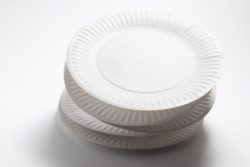Top Class Actions’s website and social media posts use affiliate links. If you make a purchase using such links, we may receive a commission, but it will not result in any additional charges to you. Please review our Affiliate Link Disclosure for more information.
Safeway and Albertsons face a class action lawsuit over allegations that the retailers sold disposable plates which contained toxic chemicals.
Plaintiff Joseph DiGiacinto, a California resident, reportedly does his best to purchase compostable, recyclable or reusable items so that he can minimize his carbon footprint.
Between 2019 and 2020, DiGiacinto says he purchased disposable Safeway plates and bowls around 10 times based on representations that these products were compostable.
The “compostable” plates are allegedly sold with representations that they are certified by the “Biodegradable Products Institute.” With the increase in popularity of compostable and biodegradable products, private certification companies have arisen to standardize and give credence to these claims.
However, the plates in question are allegedly not certified by the Biodegradable Products Institute. In fact, the Safeway reusable plates and bowls allegedly contain PFAS chemicals – dangerous chemicals which do not break down over time – and are therefore not compostable at all.
According to the Environmental Working Group (EWG), per- and poly-fluoroalkyl substances or PFAS chemicals are a family of fluorinated chemicals which arose from the development of Teflon in 1946. These chemicals have non-stick, stain-repellent and waterproof properties which make them popular in commercial use and consumer products.
Unfortunately, these useful chemicals are incredibly persistent, earning them the title of “forever” chemicals due to their inability to break down in the environment. If PFAS chemicals contaminate water, soil or even the blood of consumers, they will never break down.
“Because PFAS do not break down, they accumulate in air, soil, water and in the human body,” the Safeway and Albertsons plates class action lawsuit notes.
“One report by the Centers for Disease Control and Prevention National Health and Nutrition Examination Survey found PFAS in the blood of 97 percent of Americans.”
Based on this fact, DiGiacinto argues that the Safeway plates – which allegedly contain PFAS chemicals – cannot be represented as compostable due to their inability to break down over time.
The Safeway and Albertsons class action lawsuit claims that DiGiacinto and other consumers were deceived by representations that the products were compostable, leading them to pay a higher price for the products.
“Many consumers concerned with the environmental problems associated with the proliferation of trash and waste actively seek to purchase products that are compostable so such products can be introduced into the soil rather than landfills,” the Safeway and Albertsons plates class action lawsuit notes.
“These consumers are willing to pay more for such products, which often cost significantly more than non-compostable alternative products. Indeed, the Products cost significantly more than non-compostable disposable plates and bowls.”
Based on this overpayment for the products, DiGiacinto and other Safeway and Albertsons consumers were allegedly financially injured by the companies’ practices. If they had been aware that the products were not compostable, they would not have purchased the products or would have paid significantly less for them, DiGiacinto argues.
“Had Plaintiff known that the Products contained PFAs chemicals, and thus could not break down in an industrial composting facility, he would not have purchased the Products,” says that Safeway and Albertsons plates class action lawsuit.
“Instead, he paid considerably more for the Products than he would have for similar products that are not advertised as compostable.”

The EWG notes that PFAS chemicals have been linked to a variety of problems such as testicular cancer, kidney cancer, liver cancer, pancreatic cancer, reproductive issues, weakened childhood immunity, endocrine disruption, increased cholesterol, and more.
“Over the past two decades, PFAS have come under increasing scrutiny from toxicologists, ecologists and regulators given their persistence and connection to serious potential health effects,” the Safeway and Albertsons class action lawsuit notes.
By putting consumers at risks for these health consequences, the companies have allegedly caused further injuries to DiGiacinto and other consumers.
DiGiacinto seeks to represent a Class of people who purchased the Safeway and Albertsons plates and bowls for personal use in California. On behalf of himself and this proposed Class, DiGiacinto seeks restitution, disgorgement, compensatory damages, punitive damages, court costs, and attorneys’ fees.
Did you purchase disposable Safeway plates? Are you concerned about the presence of PFAS chemicals in these products? Share your thoughts in the comments section below.
DiGiacinto is represented by Mark N. Todzo and Meredyth Merrow of Lexington Law Group.
The Safeway and Albertsons Plates Class Action Lawsuit is DiGiacinto v. Albertsons Companies Inc., et al., Case No. 3:20-cv-03382, in the U.S. District Court for the Northern District of California.
ATTORNEY ADVERTISING
Top Class Actions is a Proud Member of the American Bar Association
LEGAL INFORMATION IS NOT LEGAL ADVICE
Top Class Actions Legal Statement
©2008 – 2024 Top Class Actions® LLC
Various Trademarks held by their respective owners
This website is not intended for viewing or usage by European Union citizens.
















79 thoughts onSafeway and Albertsons Class Action Says Stores Sold Toxic Plates
Add me
Add me.
Add me
I have used these for years and experience Heath issues
please add me. yes. I have purchase paper palates from Safeway for years. No more!!!